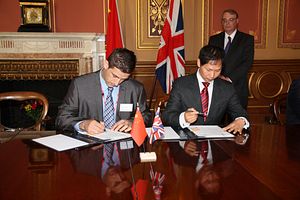In a surprise move, London announced Thursday that it will seek to join the Chinese-led Asian Infrastructure Investment Bank (AIIB), sparking an angry response from the U.S.
The (AIIB) was created by China last fall and officially rolled out with a signing ceremony in October 2014. At the original signing ceremony, 21 countries (including China) signed on to the $100 billion bank, designed to provide funding for infrastructure projects throughout the region. However, with the exception of India, most of China’s more influential neighbors abstained, including Australia, Indonesia, Japan, and South Korea. At the time, reports indicated that the U.S. government had heavily pressured these countries not to sign on.
However, AIIB has grown since its official founding. Indonesia, under new President Joko “Jokowi” Widodo, moved to join the bank in late November 2014. New Zealand signed up in January 2015, as did Saudi Arabia and Tajikistan. But London’s decision to join is truly groundbreaking, as the U.K. becomes the first European country – and the first major U.S. ally – to sign on the initiative.
On March 12, British Chancellor of the Exchequer George Osborne announced that the U.K. “intends to become a prospective founding member of the Asian Infrastructure Investment Bank,” becoming the “first major Western country” to join in. “Joining the AIIB at the founding stage will create an unrivaled opportunity for the U.K. and Asia to invest and grow together,” Osborne said.
Washington was not happy, to put it mildly. A senior official with the Obama administration told Financial Times that the decision highlighted London’s “trend toward constant accommodation of China.” The official also complained that the decision had been made with “virtually no consultation with the U.S.” U.K. officials denied that, telling The Guardian that Osborne had held discussions about the decision with his U.S. counterpart, Jack Lew.
In a statement made to The Guardian, the U.S. National Security Council said:
“Our position on the AIIB remains clear and consistent…We believe any new multilateral institution should incorporate the high standards of the World Bank and the regional development banks. Based on many discussions, we have concerns about whether the AIIB will meet these high standards, particularly related to governance, and environmental and social safeguards.”
The statement added that joining the AIIB “is the UK’s sovereign decision. We hope and expect that the UK will use its voice to push for adoption of high standards.”
Osborne’s statement included a nod to concerns about governance issues for the bank. By joining other founding members in crafting the “Articles of Agreement” that will define AIIB, the statement said, “the U.K. will play a key role in ensuring that the AIIB embodies the best standards in accountability, transparency and governance.”
China has said that shares in the AIIB will be allocated according to GDP – meaning that China would be the largest shareholder. Beijing has also offered to front up to half of the capital for the bank. Those two factors combined have some analysts worried that the AIIB will be completely controlled by Beijing, rather than having decisions made by an independent board in accordance with the World Bank model. Chinese officials have denied this, saying that China’s share in governance will gradually decrease as more and more members join.
Many analysts, including those from the U.S., have argued that if governance concerns are the true issue, Washington’s worries are best answered by having more of its allies join onto the initiative, to help shape the AIIB’s regulations from within (an argument put forth by The Diplomat’s own Prashanth Parameswaran). London appears to have adopted that mentality; the question now is whether other U.S. allies, particularly Australia and South Korea, will break with the U.S. and follow London’s example.
Australia’s government, under Prime Minister Tony Abbott, has so far seemed resolved to stay away from the AIIB until its concerns about governance are addressed. However, as the Sydney Morning Herald notes, the British decision has some members of the Australian Cabinet rethinking their stance. The debate is expected to come to a head in a cabinet meeting in late March – and “some close observers” told the SMH that they expect “to see a heavily-conditional commitment to join.” Australian Trade Minister Andrew Robb even said he was “confident” that Australia “will end up joining” the bank.
SMH also notes that Australia and South Korea have been working together “to forge a united position on acceptable governance standards” – meaning that if Canberra decides to give a conditional commitment, Seoul might do so as well. South Korean Finance Minister Choi Kyung-hwan previously said that if Seoul’s governance concerns are met, “there will be no reason for us not to join the AIIB.”
China has set a deadline for joining the AIIB as a founding member – according to Finance Minister Lou Jiwei, countries must join by March 31. That means March will likely see a final push for new prospective members. Lou dangled the possibility of more surprise additions to the bank, saying that Japan is considering a bid, as are several unnamed “major” European countries. However, Lou said AIIB would focus first on Asian nations before considering adding extra-regional countries as members.
Chinese Foreign Ministry spokesperson Hong Lei said that China “welcomes the United Kingdom’s decision” to join AIIB. Hong also emphasized that the AIIB will be governed and operated according to the principles of “openness, inclusiveness, transparency, responsibility, and fairness.” He added, “It will learn from the good practices of the existing multilateral development banks, and meanwhile avoid the alike problems they have encountered to reduce the cost and operate more effectively.”

































